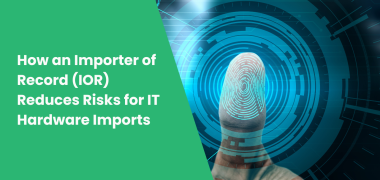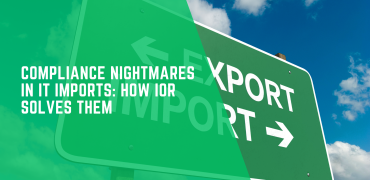In the global economy, businesses frequently import IT hardware to support their operations, upgrade technology infrastructure, or resell to customers. However, the process of importing IT hardware, such as servers, networking equipment, and computing devices, is fraught with regulatory, logistical, and financial challenges. One solution to these complexities is partnering with an Importer of Record (IOR).
An IOR plays a pivotal role in ensuring the smooth and compliant import of IT hardware, helping businesses mitigate risks and streamline the import process. In this article, we’ll explore the concept of an IOR, their responsibilities, and how they can significantly reduce risks for IT hardware imports.
Understanding the Importer of Record (IOR)
An Importer of Record is a legal entity or individual responsible for ensuring compliance with all regulations and requirements when goods are imported into a country. The IOR assumes responsibility for:
- Ensuring compliance with customs regulations.
- Paying applicable duties, taxes, and fees.
- Handling necessary permits and documentation.
For IT hardware imports, the IOR acts as the intermediary between the exporting company and the destination country’s customs authorities, navigating complex trade laws to ensure that shipments are processed efficiently.
Key Challenges in IT Hardware Imports
The importation of IT hardware comes with specific challenges, including:
1. Compliance with Trade Regulations:
Countries have stringent regulations governing the import of IT hardware. These include:
- Restrictions on specific technologies due to encryption or security concerns.
- Adherence to local certification standards (e.g., CE marking in Europe, FCC compliance in the U.S.).
- Import bans on refurbished or used IT equipment in certain jurisdictions.
2. Tariffs and Taxes:
Duties and taxes on IT equipment can vary significantly, depending on:
- Harmonized System (HS) codes used for classification.
- Free trade agreements between the exporting and importing countries.
3. Licensing and Permits:
Many IT products require special permits or certifications, such as:
- Radiofrequency licenses for wireless equipment.
- Data encryption approvals for cybersecurity hardware.
4. Data Privacy Concerns:
Hardware capable of storing or processing data may be subject to additional scrutiny to ensure it complies with data protection laws.
How an Importer of Record Reduces Risks
Engaging an IOR offers businesses several advantages, minimizing risks and ensuring the successful delivery of IT hardware.
1. Ensures Regulatory Compliance
One of the primary responsibilities of an IOR is to ensure that shipments comply with the destination country’s import laws.
- Customs Compliance:
An IOR ensures accurate classification of goods using the correct HS codes, avoiding misclassification that can lead to fines or shipment delays. - Certification Management:
The IOR handles all required certifications, such as safety, environmental, and technical standards, ensuring that IT hardware meets the importing country’s regulatory requirements. - Restricted Items:
For IT hardware that includes restricted technologies, such as advanced encryption, the IOR manages the necessary approvals and avoids penalties for non-compliance.
2. Mitigates Financial Risks
The IOR manages financial aspects of the import process, reducing the risk of unexpected costs.
- Accurate Duty and Tax Calculations:
The IOR calculates and pays all duties, tariffs, and taxes on behalf of the importer, ensuring no underpayment or overpayment occurs. - Avoids Fines and Penalties:
With their expertise, IORs reduce the risk of errors that could lead to costly penalties or delays. - Efficient Handling of Disputes:
If customs authorities challenge the valuation or classification of goods, the IOR can address these disputes effectively.
3. Manages Complex Documentation
Importing IT hardware involves a myriad of documents, including:
- Commercial invoices.
- Packing lists.
- Certificates of origin.
- Import permits.
The IOR ensures that all required documents are prepared accurately and submitted on time, minimizing the risk of delays.
4. Streamlines Logistics
An IOR ensures that shipments are handled efficiently from port to destination.
- Customs Clearance Expertise:
The IOR coordinates with customs brokers to ensure timely clearance of goods, avoiding demurrage fees and storage charges. - Coordination with Freight Forwarders:
By working closely with logistics providers, the IOR ensures that the shipment process remains smooth and transparent.
5. Protects Against Liability
In case of disputes or legal challenges, the IOR assumes liability, shielding businesses from risks associated with non-compliance or errors in the import process.
Specific Benefits for IT Hardware Importers
The unique nature of IT hardware imports means that partnering with an IOR can yield additional advantages:
1. Ensures Technology-Specific Compliance
- Radiofrequency-enabled devices (e.g., routers, mobile devices) often require approval from telecommunications regulatory authorities.
- The IOR navigates these requirements seamlessly.
2. Facilitates Multi-Country Imports
For global deployments, such as IT hardware for multinational offices or data centers, an IOR can manage imports across multiple jurisdictions, ensuring uniform compliance.
3. Supports Refurbished Equipment Imports
Importing used or refurbished IT hardware can be particularly challenging due to restrictions. An experienced IOR can help secure necessary permits and approvals.
4. Handles Data Security Concerns
With growing concerns over cybersecurity, IT hardware with data encryption features may require special clearances. The IOR ensures adherence to these security requirements.
Selecting the Right IOR Partner
To maximize the benefits of working with an IOR, businesses should carefully select their partner. Consider the following criteria:
1. Industry Expertise
Choose an IOR with specific experience in IT hardware imports, as they will be familiar with the nuances of technology regulations.
2. Geographic Reach
For businesses operating in multiple countries, an IOR with a global presence can streamline the import process across various jurisdictions.
3. Compliance Record
Check the IOR’s track record in maintaining compliance and resolving disputes efficiently.
4. Technology Integration
Look for IORs that use advanced technology for real-time shipment tracking and documentation management.
Case Study: How an IOR Helped Streamline IT Hardware Imports
Scenario: A multinational IT firm needed to import servers and networking equipment into 15 countries to set up regional data centers. Each country had distinct regulations and certification requirements for IT equipment.
Challenges Faced:
- Complying with encryption technology import restrictions.
- Securing radiofrequency licenses for wireless equipment.
- Managing customs clearance in jurisdictions with varying tax structures.
IOR Solution:
The firm partnered with an IOR with extensive experience in IT hardware imports. The IOR:
- Secured all necessary permits and certifications for each country.
- Managed customs clearance, ensuring no delays or penalties.
- Provided detailed cost breakdowns for duties and taxes, helping the firm budget accurately.
Outcome:
The project was completed on schedule, and the company avoided regulatory pitfalls and financial overruns.
Conclusion
Importing IT hardware is a complex process that requires expertise, meticulous attention to detail, and compliance with a myriad of regulations. An Importer of Record serves as a critical partner in mitigating risks, handling documentation, ensuring compliance, and protecting businesses from liability.
By leveraging an IOR’s expertise, businesses can focus on their core operations while ensuring that their IT hardware imports are handled efficiently and securely. For companies looking to expand their global footprint or deploy advanced technology, partnering with an experienced IOR is not just a convenience—it’s a strategic necessity.




